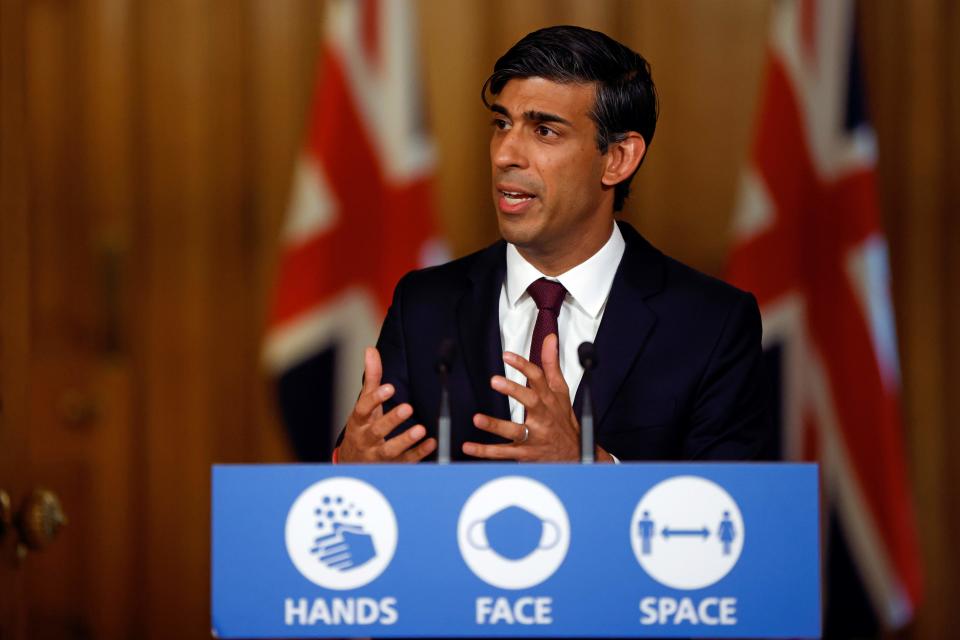What you need to know about the economy, jobs and the 'Winter Economy Plan'

It’s been another wild week for the economy, as governments continue to grapple with the fallout from the coronavirus.
On Monday and Tuesday respectively, there were dispatches from the UK’s chief medical officer Chris Whitty, warning that Brits need to continue following guidelines to avoid a punishing second wave of the virus, and new restrictions were outlined by Boris Johnson.
New rules announced included a 10pm curfew for hospitality in England which those working in the sector have warned will be a threat to business, and has since seen crowds gather in the street at closing time for pubs.
Rishi Sunak also outlined the “Winter Economy Plan” on Thursday, calling the new policies a “radical intervention” in the labour market and said saving jobs was his “number one priority” in a statement to MPs in the Commons.
Winter is coming: the plan for the economy
Sunak announced an extension of four coronavirus loan schemes for firms, VAT cuts for the hospitality sector, and more time for firms and individuals to pay taxes.
He also extended grants for the self-employed for six months, though only covering 20% of average monthly profits.
The centre-piece of the announcement on Thursday was a “job support scheme,” drawn up as a successor to the furlough scheme which has kept millions of workers employed.
It essentially tapers off the work the job support scheme has already done and is designed to prevent redundancies by topping-up the wages of workers who work and are paid for at least a third of their typical hours.
The Treasury said employees working a third of their usual hours would receive 77% of their normal pay.
The chancellor said the job support scheme could cost about £300m ($382m) a month if employers sought funds to keep on a million workers. But he said it was “very tricky to be precise” about total costs given uncertainty over many of the assumptions behind any such calculations.
Analysis by Capital Economics estimated the total cost at £3bn, with another £2bn for the other new measures.
What’s next in the jobs market?
Despite the measures he has set out for companies and employees, Sunak has admitted unemployment will continue to rise.
Firms had cautiously welcomed the measures but warned that they did not go far enough to prevent lay-offs.
In spite of this, a bright spot for jobs, new figures showed the number of new job adverts posted online last week hit its highest weekly total since early March before the coronavirus lockdown.
A survey by the Recruitment & Employment Confederation (REC) found almost 129,000 vacancies had been advertised between 14 and 20 September. It marked a 3% increase on the previous week, and the total number of postings is now up by a quarter on levels seen at the start of June.
The data will boost hopes of at least a partial recovery in the UK jobs market, despite rising unemployment that UK chancellor Rishi Sunak admitted on Thursday would continue to grow still further.
Employers have slashed hundreds of thousands of jobs in recent months, but hiring has also picked up. Major supermarkets and logistics firms like Tesco (TSCO.L) and Amazon (AMZN) are among those to have announced recent hiring sprees, but the latest data suggests hiring in education sector has also picked up as the new school year gets underway.
UK government borrowing hits highest level in decades
While the government attempts to insure the jobs market for the next few months, borrowing has hit its highest level in decades.
The cash required to keep the economy afloat has pushed borrowing to £173.7bn between April and August. New official figures show it’s £146.9bn higher than a year earlier.
It marked the highest since the Office for National Statistics began compiling the data in 1993.
Total government debt stood at £2tn at the end of August, 1.9% bigger than the size of the entire UK economy's output and £249.5bn more than a year earlier. It marks the highest debt ratio since 1961, as GDP has also plummeted, shrinking at its steepest quarterly rate since records began earlier this year.

 Yahoo Finance
Yahoo Finance 